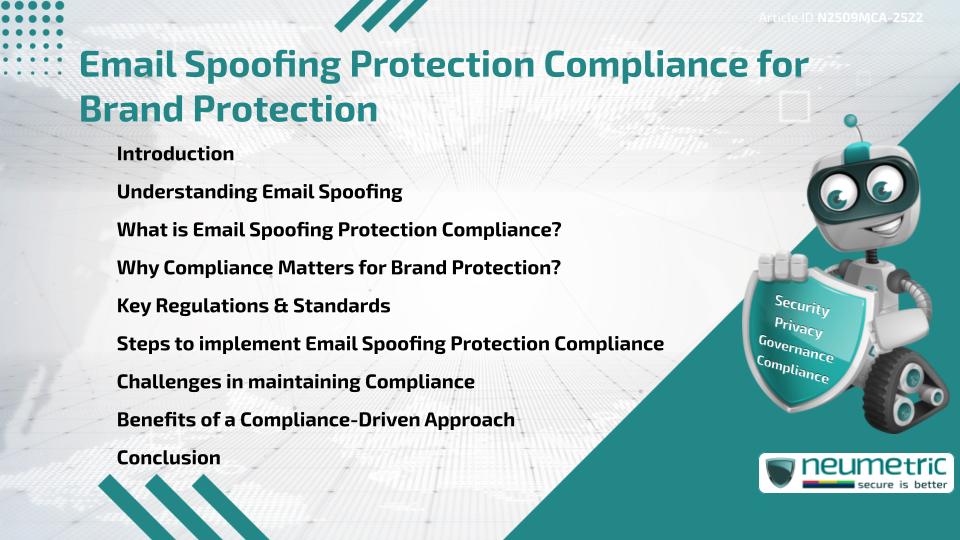Table of Contents
ToggleIntroduction
Email remains the backbone of business communication, but it is also the most exploited attack vector. Cybercriminals often use spoofed emails to impersonate trusted brands, deceive recipients & launch phishing or fraud attempts. Such attacks erode Customer Trust & can lead to severe Financial & reputational losses. To counter this, organisations are turning toward email spoofing protection compliance, a structured approach that ensures email authenticity & safeguards brand reputation.
Understanding Email Spoofing
Email spoofing is a tactic where attackers forge the sender’s address to make messages appear legitimate. Commonly used in phishing campaigns, these emails can trick recipients into sharing Sensitive Data or downloading malicious files. Since spoofed emails seem to come from trusted domains, they can bypass basic security filters & cause significant damage.
What is Email Spoofing Protection Compliance?
Email spoofing protection compliance refers to adopting Industry Standards, frameworks & Security Controls that authenticate outgoing emails & prevent impersonation. It ensures organisations meet regulatory requirements while maintaining Customer Trust. Core elements include:
- SPF (Sender Policy Framework): Defines authorised mail servers for sending domain emails
- DKIM (DomainKeys Identified Mail): Adds digital signatures to verify authenticity
- DMARC (Domain-based Message Authentication, Reporting & Conformance): Enforces email validation Policies & provides reporting
Together, these mechanisms form the backbone of compliance-driven brand protection.
Why Compliance Matters for Brand Protection?
- Preserves trust – Customers & partners are less likely to fall victim to spoofed messages.
- Prevents fraud losses – Blocks fraudulent Financial transactions linked to phishing.
- Strengthens reputation – Demonstrates a proactive security stance to Stakeholders.
- Meets regulations – Frameworks such as GDPR, HIPAA & PCI DSS expect strong Data Protection & secure communication.
Key Regulations & Standards
Several compliance frameworks highlight the need for email security:
- GDPR: Requires secure handling of Personal Data & communication.
- PCI DSS: Expects robust measures to prevent payment fraud.
- HIPAA: Mandates protection of health-related communications.
- ISO 27001: Emphasises Risk Management & secure information exchange.
Implementing email spoofing protection aligns with these Compliance Requirements, reducing legal & Financial Risks.
Steps to implement Email Spoofing Protection Compliance
- Conduct a domain Audit – Identify all domains used for sending emails, including marketing & transactional systems.
- Deploy SPF, DKIM & DMARC – Establish strong authentication controls.
- Enable monitoring & reporting – Use DMARC reports to track unauthorised email activity.
- Educate Employees & Customers – Raise awareness about email spoofing tactics.
- Regularly review compliance – Align with updated security frameworks & evolving Threat landscapes.
Challenges in maintaining Compliance
While essential, email spoofing protection compliance has hurdles:
- Complex configurations across multiple domains
- Balancing strict Policies with legitimate Third Party sender
- Lack of visibility into shadow IT email systems
- Continuous updates required to adapt to evolving phishing tactics
Benefits of a Compliance-Driven Approach
- Reduced phishing attacks targeting Customers & Employees
- Enhanced deliverability of legitimate business emails
- Improved forensic visibility into attempted attacks
- Sustainable trust among Stakeholders & clients
Conclusion
In today’s digital landscape, brand reputation is closely tied to security resilience. Email spoofing remains a major Threat, but with structured email spoofing protection compliance, businesses can safeguard their communication channels, meet regulatory demands & protect Customer Trust.
Key Takeaways
- Email spoofing impersonates trusted brands & undermines security.
- Compliance ensures authentication protocols like SPF, DKIM & DMARC are in place.
- Protecting against spoofing reduces fraud, supports regulations & maintains brand credibility.
- Ongoing monitoring & awareness are critical for sustained protection.
FAQs
What is the role of DMARC in email spoofing protection compliance?
DMARC enforces sender authentication Policies & provides reports that help organisations block spoofed messages & monitor misuse of their domain.
How does email spoofing impact brand reputation?
Spoofed emails trick Customers into believing fraudulent messages are legitimate, leading to distrust, Financial loss & reputational damage.
Is email spoofing protection mandatory for compliance?
While not always explicitly mandated, frameworks like GDPR, PCI DSS & ISO 27001 expect organisations to secure communications, making it a compliance necessity.
What industries benefit most from email spoofing protection compliance?
Financial services, Healthcare, e-commerce & Government entities face higher spoofing Risks & benefit significantly from compliance-driven protections.
Can Small Businesses implement spoofing protection easily?
Yes. Cloud-based solutions simplify SPF, DKIM & DMARC setup, making compliance feasible even for small enterprises.
Need help for Security, Privacy, Governance & VAPT?
Neumetric provides organisations the necessary help to achieve their Cybersecurity, Compliance, Governance, Privacy, Certifications & Pentesting needs.
Organisations & Businesses, specifically those which provide SaaS & AI Solutions in the Fintech, BFSI & other regulated sectors, usually need a Cybersecurity Partner for meeting & maintaining the ongoing Security & Privacy needs & requirements of their Enterprise Clients & Privacy conscious Customers.
SOC 2, ISO 27001, ISO 42001, NIST, HIPAA, HECVAT, EU GDPR are some of the Frameworks that are served by Fusion – a SaaS, multimodular, multitenant, centralised, automated, Cybersecurity & Compliance Management system.
Neumetric also provides Expert Services for technical security which covers VAPT for Web Applications, APIs, iOS & Android Mobile Apps, Security Testing for AWS & other Cloud Environments & Cloud Infrastructure & other similar scopes.
Reach out to us by Email or filling out the Contact Form…


